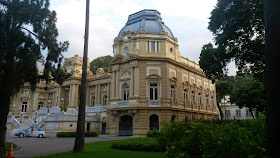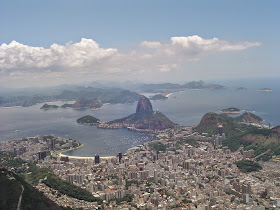PARIS
To paraphrase Oscar Wilde, for a global city to be hit by a terror attack once a year can be considered a misfortune; to be hit twice smacks of gross negligence. Add to that that my neighborhood is the only one with the dubious honor of having been targeted twice makes me wonder if time hasn't come for me to move permanently to my second home, Rio de Janeiro. Now, that would be the mother of all ironies: seeking refuge from terror in a city well-known for random violence.
But we live in troubled times where what made sense for so long suddenly doesn't. Here is a short summary of the last 48 hours.
As (bad) luck would have it, as in the dreadful events last January (which I recounted in this post ) I was at home on Friday evening, relaxing from a long week of SAP-to-Workday workshops at French pharma giant Sanofi, when I heard the ear-splitting sound of sirens. At the beginning I didn't pay much attention, but after a while it suddenly hit me that the blaring sirens had been going at it for a good fifteen minutes. A quick look at the city skyline didn't reveal any Neronian fire. An accident, maybe? Then the ominous alternative crept into my mind: another attack?
I grabbed the TV remote control and tuned into one of the 24-hour French channels. My hunch was confirmed: another series of terror attacks have hit my hometown with my neighborhood once again targeted.(Dear Mr. Terrorist, I don't mind your being bloodthirsty. But do you also have to be unfair? Would you mind spreading the victim share among all Paris districts? Next time, could you try Montorgueuil? Or the 16th arrondissement? Why not cross the Seine and have fun in the Left Bank?)
Since the action was taking place just a few blocks away from my place, I grabbed my coat and ran out. It was around 11 pm. By then I had already received some text/Whatsapp messages from friends and family who, when apprised of my intention to go to the Bataclan concert hall, tried to dissuade me. But there was no way I was going to experience the events vicariously on a small screen when I could witness them live.
The next few hours will probably never be erased from my memory. In the cold fall night I stood and watched as the elite security squads forced their way in using their guns in deafening noise, soon to be followed by explosions as the terrorists blew themselves up. Then the sad sight of bodies being retrieved. My phone battery died but I managed to shoot (no pun intended) a couple of videos and take some pictures. I'll never forget the distraught young man whose two brothers were inside the Bataclan (where I had been many times for some popular parties) and who tried to go in but was restrained by the cops (I later heard they had both died).
Few people managed to sleep that night in the neighborhood, or in the city. The next morning I woke up early and went back to see the remains of the carnage: the sad pair of shoes of a concert goer who never suspected that his Friday fun would put an end to his life. Still-fresh blood on the pavement was a reminder of the horror that took place just a few hours ago.
People were too shocked to engage in meaningful and rational discourse. But some questions were being asked and the government's official version challenged:
- Some claimed that many who died didn't die at the hands of the attackers but as side effect of the police action - collateral damage, they'd call it in the US (but the supine press won't tell you about it.)
- Also, how come that for the second time in a year, and even more spectacularly, terrorists were allowed to operate freely in France?
-Was this timed for the the looming key regional election where the incompetent government headed by the Clown-in-Chief; François Hollande, is expected to suffer a big defeat? (I watched him on TV and his incompetence was eerily reminiscent of Gerge W. Bush as captured in Fahrenheit 9/11: both "leaders" showing they were not up to the task)
- Should France continue to target IS (Islamic State - not Information Systems) in Syria, if IS can retaliate so easily and spectacularly in France?
The media vultures were all over the place and I was flabbergasted to see their reporters interviewing basically anybody who walked up to them and served them any cock-and-bull story. A Spanish anchorwoman basically bought lock, stock and barrel what was clearly the rants of an old woman who kept on referring to the Second World War. Other reporters fed their audience the asinine comments that all of us will later lap up while watching TV. A wise neighbor told me, "The only group who knows less than reporters is the government: and the little they know, they are not telling us." Couldn't disagree with him, since the entire French political class has lost the last shreds of respect from the citizenry. They can't fix the environment, but spend billions organizing a useless COP21 jamboree whose only function is to serve as a political marketing ploy for the government (regional elections were undemocratically pushed back to help the moron masquerading as French president win a few votes with the event's reflected glory). They can't fix the economy, nor unemployment now at record levels, and even less immigration. At least we thought they could keep us safe but, as this year's events are proving, the political class is also proving to be an abject failure at security. So, why are we putting up with them much longer? Shouldn't such low performers have been discarded long ago? Beats me.
In moments like these, scared people give the impression of rallying behind the "leader" who has no idea in what direction to lead us. But deep down inside of them, most know it is hopeless.
Last night, I took the metro around 10 pm and was deeply shocked to find it empty. I was born here and have never seen an empty metro on a Saturday night. The streets were equally empty, reminding me of that Friday in the early 90s when I was living in New York City and we were told at noon to go home because of the fear the Rodney King riots from Los Angeles would spill over in Manhattan. Last night in Paris I was eerily reminded of that distant Friday when I walked from the UN building towards Grand Central Station and the greatest city on earth was deserted in anticipation of possible mayhem. But in ghost-town Paris disaster had already struck. And will strike again. No solution is in sight.
Poor Paris.
Poor France.
(Except for the Christ the Redeemer picture, all photos and videos by the blogger)
UPDATE: Nov. 26, 2015. A week ago, while browsing through press accounts I stumbled on the name of a victim ("Djamila Houd") and her place of origin (Dreux, South west of Paris). I immediately emailed Tassadit Houd, one of my oldest friends, who is from Dreux, asking her whether she was a relative. I was getting worried when I couldn't get through to Tassadit and today I finally heard from her: Djamila was indeed a relative. Her own sister! She and her family are devastated. It took them 10 days before they got to bury her. Djamila was having a quiet dinner at the sidewalk restaurant La Belle Equipe (belonging to her husband, Gregory) when she was shot twice in the back. Here's the account by the local paper. In the family picture at the funeral my friend Claire Tassadit is the second from the right. Another press report quotes my dear friend Tassadit's tribute to her sister.
 |
| My second city's tribute to my hometown |
But we live in troubled times where what made sense for so long suddenly doesn't. Here is a short summary of the last 48 hours.
As (bad) luck would have it, as in the dreadful events last January (which I recounted in this post ) I was at home on Friday evening, relaxing from a long week of SAP-to-Workday workshops at French pharma giant Sanofi, when I heard the ear-splitting sound of sirens. At the beginning I didn't pay much attention, but after a while it suddenly hit me that the blaring sirens had been going at it for a good fifteen minutes. A quick look at the city skyline didn't reveal any Neronian fire. An accident, maybe? Then the ominous alternative crept into my mind: another attack?
I grabbed the TV remote control and tuned into one of the 24-hour French channels. My hunch was confirmed: another series of terror attacks have hit my hometown with my neighborhood once again targeted.(Dear Mr. Terrorist, I don't mind your being bloodthirsty. But do you also have to be unfair? Would you mind spreading the victim share among all Paris districts? Next time, could you try Montorgueuil? Or the 16th arrondissement? Why not cross the Seine and have fun in the Left Bank?)
Since the action was taking place just a few blocks away from my place, I grabbed my coat and ran out. It was around 11 pm. By then I had already received some text/Whatsapp messages from friends and family who, when apprised of my intention to go to the Bataclan concert hall, tried to dissuade me. But there was no way I was going to experience the events vicariously on a small screen when I could witness them live.
The next few hours will probably never be erased from my memory. In the cold fall night I stood and watched as the elite security squads forced their way in using their guns in deafening noise, soon to be followed by explosions as the terrorists blew themselves up. Then the sad sight of bodies being retrieved. My phone battery died but I managed to shoot (no pun intended) a couple of videos and take some pictures. I'll never forget the distraught young man whose two brothers were inside the Bataclan (where I had been many times for some popular parties) and who tried to go in but was restrained by the cops (I later heard they had both died).
Few people managed to sleep that night in the neighborhood, or in the city. The next morning I woke up early and went back to see the remains of the carnage: the sad pair of shoes of a concert goer who never suspected that his Friday fun would put an end to his life. Still-fresh blood on the pavement was a reminder of the horror that took place just a few hours ago.
 |
| Apologies for the gory details but sometimes you need to face reality head-on |
People were too shocked to engage in meaningful and rational discourse. But some questions were being asked and the government's official version challenged:
- Some claimed that many who died didn't die at the hands of the attackers but as side effect of the police action - collateral damage, they'd call it in the US (but the supine press won't tell you about it.)
- Also, how come that for the second time in a year, and even more spectacularly, terrorists were allowed to operate freely in France?
-Was this timed for the the looming key regional election where the incompetent government headed by the Clown-in-Chief; François Hollande, is expected to suffer a big defeat? (I watched him on TV and his incompetence was eerily reminiscent of Gerge W. Bush as captured in Fahrenheit 9/11: both "leaders" showing they were not up to the task)
- Should France continue to target IS (Islamic State - not Information Systems) in Syria, if IS can retaliate so easily and spectacularly in France?
 |
| A victim's scattered sad belongings: A testimony to the horror that took place a couple of hours ago |
The media vultures were all over the place and I was flabbergasted to see their reporters interviewing basically anybody who walked up to them and served them any cock-and-bull story. A Spanish anchorwoman basically bought lock, stock and barrel what was clearly the rants of an old woman who kept on referring to the Second World War. Other reporters fed their audience the asinine comments that all of us will later lap up while watching TV. A wise neighbor told me, "The only group who knows less than reporters is the government: and the little they know, they are not telling us." Couldn't disagree with him, since the entire French political class has lost the last shreds of respect from the citizenry. They can't fix the environment, but spend billions organizing a useless COP21 jamboree whose only function is to serve as a political marketing ploy for the government (regional elections were undemocratically pushed back to help the moron masquerading as French president win a few votes with the event's reflected glory). They can't fix the economy, nor unemployment now at record levels, and even less immigration. At least we thought they could keep us safe but, as this year's events are proving, the political class is also proving to be an abject failure at security. So, why are we putting up with them much longer? Shouldn't such low performers have been discarded long ago? Beats me.
In moments like these, scared people give the impression of rallying behind the "leader" who has no idea in what direction to lead us. But deep down inside of them, most know it is hopeless.
Last night, I took the metro around 10 pm and was deeply shocked to find it empty. I was born here and have never seen an empty metro on a Saturday night. The streets were equally empty, reminding me of that Friday in the early 90s when I was living in New York City and we were told at noon to go home because of the fear the Rodney King riots from Los Angeles would spill over in Manhattan. Last night in Paris I was eerily reminded of that distant Friday when I walked from the UN building towards Grand Central Station and the greatest city on earth was deserted in anticipation of possible mayhem. But in ghost-town Paris disaster had already struck. And will strike again. No solution is in sight.
Poor Paris.
Poor France.
(Except for the Christ the Redeemer picture, all photos and videos by the blogger)
UPDATE: Nov. 26, 2015. A week ago, while browsing through press accounts I stumbled on the name of a victim ("Djamila Houd") and her place of origin (Dreux, South west of Paris). I immediately emailed Tassadit Houd, one of my oldest friends, who is from Dreux, asking her whether she was a relative. I was getting worried when I couldn't get through to Tassadit and today I finally heard from her: Djamila was indeed a relative. Her own sister! She and her family are devastated. It took them 10 days before they got to bury her. Djamila was having a quiet dinner at the sidewalk restaurant La Belle Equipe (belonging to her husband, Gregory) when she was shot twice in the back. Here's the account by the local paper. In the family picture at the funeral my friend Claire Tassadit is the second from the right. Another press report quotes my dear friend Tassadit's tribute to her sister.
 |
| IN MEMORIAM Djamila Houd, a Muslim victim of Islamist terrorists. She leaves behind a husband and an 8-year-old girl who will become a "Ward of the Nation" |






























